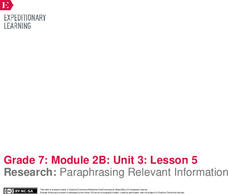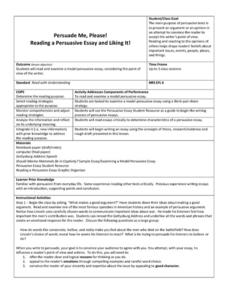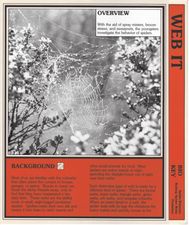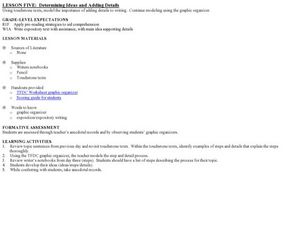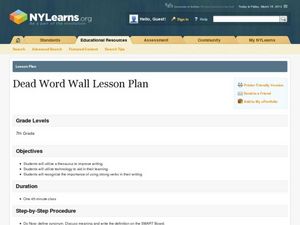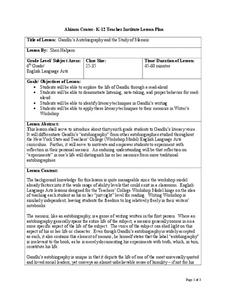Curated OER
Revision
Young poets learn the value of using a thesaurus when crafting and revising poems. They examine poems rich in figurative language and then a revised version with the figurative language removed. To demonstrate what they have learned,...
Houston Teachers Institute
Alice in Wonderland: Nonsense and Logic in Literature
Alice's Adventures in Wonderland is known for its fantastical imagery and nonsense verse. This unit plan offers a basic exploration into nonsense verse through poetry and teacher read-alouds. It incorporates activities involving poetry...
Curated OER
Blogging
A fun, modern twist on journaling! Instead of responding to prompts in their composition notebook, writers use the Internet to complete blog entries. A sample blog (with prompts) is shown here, and writers are assessed on conventions and...
EngageNY
Research: Paraphrasing Relevant Information
Young writers practice paraphrasing information from Truth in Advertising? They keep an eye out for examples of false advertising as they read, recording ideas and information in their researcher's notebook along the way.
Curated OER
Informative Essay Writing
High schoolers start by drawing Mr. Essay Man, who is supposed to illustrate the different parts of an essay. After discussing what each component should contain, writers start their essay, guided by the teacher and class discussion....
Curated OER
Basic Paragraph
Explore basic paragraphs. Young writers compose a topic sentence, supporting sentences, and a concluding sentence. This lesson is intended for use with a SMART Board, a software technology web link is induced.
Curated OER
Persuade Me, Please! Reading a Persuasive Essay and Liking It!
Persuade your writers that crafting arguments is not that difficult. They only need to follow the steps outlined in this resource.
Curated OER
Guest Speaker Preparation: A Cooperative Lesson
Are you planning to have a guest speaker talk to your class? Prepare in advance and help your class transform into an engaged and thoughtful audience. Before the visit, young writers work cooperatively to brainstorm what they want to...
Curated OER
Web It!
Looking for a way to bring prewriting into your informative writing unit? Use this lesson to reinforce writing skills in your eighth grade language arts class. Young writers use a web graphic organizer as a prewriting tool for expository...
Curated OER
The Memory Invention
Young writers edit their writing to make sure it shows good meaning and clarity. In this writing lesson, students are given a variety of "What If?" scenarios to choose from as writing prompts. A class discussion ensues, which focuses on...
Curated OER
Sentence Patterns
Supplement instruction on sentence patterns and types by providing this reference sheet for your class members. Included on this page are definitions of many different sentence patterns and an example of each. A useful item for pupils to...
Curated OER
Determining Ideas and Adding Details
A handy TFDC (topic/fact/detail/conclusion) graphic organizer (included) allows young writers to outline and record their main ideas and supporting details in the prewriting phase. They then continue to add details to the topic sentences...
Curated OER
Connect the Dots and Write: Classroom
Beginning readers and writers connect the dots from images to words while practicing printing. A second activity requires that they determine what letter(s) is missing from the same list of words.
Curated OER
Eliminate Weak Verb-Adverb Combinations
Encourage your writers to use sob instead of cry loudly to trade in adverbs for strong verbs. Improve your middle and high schoolers' writing with this humorously written lesson which demonstrates how to remove excessive adverbs.
Curated OER
Dead Word Wall Lesson
Help your writers eliminate "dead words" (words that are overused) from their writing. This lesson includes a SMART board presentation that will guide them through identifying, eliminating, and substituting "dead words" from sample...
Bright Hub Education
How to Use Commas Correctly
Commas can be quite confusing. Young writers target troublesome grammar skills by focusing on the four most troubling uses: joining two independent clauses, separating introductory materials in a sentence, separating unnecessary...
Curated OER
Lesson Plan 2: Good Novel, Bad Novel
What are the characteristics of a good piece of writing? What makes a story interesting? Give your pupils a chance to define the qualities of good novels and what they see as the qualities of bad novels. Class members record these...
Curated OER
Learning Grammar Through Wordplay
Students use wordplay to investigate the grammatical components of a sentence. They read a New York Times article by analyzing the writer's use of nouns and verbs in the article and then constructing original sentences using those words...
Curated OER
When I Was Young in Brooklyn
Students identify various techniques used in memoirs. They reflect on similarities and differences betwee two authors. Students define the term memior. They write about various techiques they noticed the authors used. Students write...
Curated OER
Getting Ready to Write
Students watch an online slideshow that shows Cornelia Funke's transition from an illustrator to a writer. They discuss her writing process from the way she gathers ideas to how and where she writes. Next, they work in groups to choose a...
Poetry4kids
How to Start a Poetry Journal
Practice makes proficient! Using a journal of their choice, authors organize pages, then begin their writing journey of on-going writing practice in which they compose all poetic forms including diamante, limerick, free verse, and more!
Meadows Center for Preventing Educational Risk, University of Texas at Austin
Lesson 12 - Ed Suffix with Unchanging Base Words
Understanding different verb tenses begins with knowing how to decode words. A lesson on the -ed suffix with unchanging base words introduces readers to the past tense. Teachers present the skill with oral reading and spelling...
Meadows Center for Preventing Educational Risk, University of Texas at Austin
Lesson 10 - Compound Words
Individually, words have power, but when added together, they can take on a whole other level of meaning. Readers learn about compound words in the 10th of 17 lessons of the Word Recognition and Fluency series. A script provides guidance...
Curated OER
Gandhi's Autobiography and the Study of Memoir
Seventh graders explore the life of Gandhi using his autobiography and memoir. In this Gandhi exploration lesson, 7th graders analyze Gandhi's literary voice by reading his autobiography. Students identify literary techniques in Gandhi's...
Other popular searches
- Making a Writers Notebook
- Decorating Writers Notebook
- Creating a Writers Notebook
- Writers Notebook Lesson Plan
- R Fletcher Writer's Notebook





